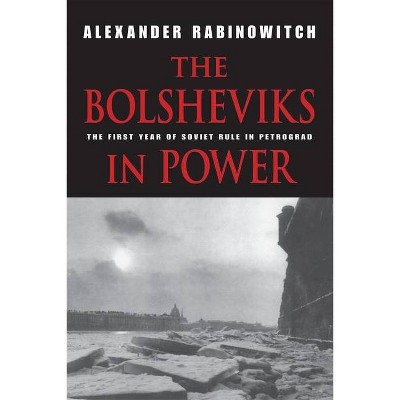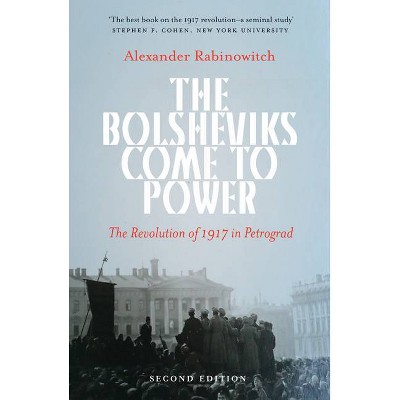The Bolsheviks in Power - by Alexander Rabinowitch (Paperback)

Similar Products
Products of same category from the store
AllProduct info
<p/><br></br><p><b> About the Book </b></p></br></br>The book covers issues such as the rapid fall of influential moderate Bolsheviks, the formation of the dreaded Cheka, the dissolution of the Constituent Assembly, the Red Terror, the national government's flight to Moscow, and the subsequent rivalry between Russia's new and old capitals.<p/><br></br><p><b> Book Synopsis </b></p></br></br><p>A major contribution to the historiography of the world in the 20th century, <i>The Bolsheviks in Power</i> focuses on the fateful first year of Soviet rule in Petrograd. It examines events that profoundly shaped the Soviet political system that endured through most of the 20th century. Drawing largely from previously inaccessible Soviet archives, it demolishes standard interpretations of the origins of Soviet authoritarianism by demonstrating that the Soviet system evolved ad hoc as the Bolsheviks struggled to retain political power amid spiraling political, social, economic, and military crises. The book covers issues such as the rapid fall of influential moderate Bolsheviks, the formation of the dreaded Cheka, the dissolution of the Constituent Assembly, the Red Terror, the national government's flight to Moscow, and the subsequent rivalry between Russia's new and old capitals.</p><p/><br></br><p><b> Review Quotes </b></p></br></br><br><p>A meticulous and fine-grained study of the first year of 'soviet rule' in Petrograd. . . . Rabinowitch maintains a dispassionate tone and is scrupulously measured in his judgments. . . . His book can justly be said to provide a definitive political history of the city during the first year of Bolshevik rule.August, 2008</p>--Steve Smith "New Left Review"<br><br><p>A significant work of historical scholarship. It will serve, for years to come, as an essential reference point for the study of the political and social aftermath of the overthrow of the bourgeois Provisional Government and the establishment of the Bolshevik regime. In contrast to so many others working in the field of Soviet studies, who have adapted themselves to the prevailing climate of intellectual dishonesty and cynicism, Professor Rabinowitch has not compromised his integrity as a scholar. He has produced an important contribution.</p>-- "World Socialist Review"<br><br><p>Alexander Rabinowich's previous works on revolutionary Petrograd have long stood as benchmarks in the field. [The Bolsheviks in Power] will join its partner volumes on the shelf of classics . . . This painstakingly researched and beautifully written book will be required reading for all specialists of the period and makes a great contribution to our understandings of the course of revolution and civil war. December 2008</p>--Sarah Badcock "University of Nottingham"<br><br><p>Alexander Rabinowitch's account of the first year of Bolshevik politics is a work of outstanding merit that sets a standard rarely achieved in the genre of political history. . . . It is a history full of heroes, fools, and fanatics, yet recounted in a sober and nonjudgmental manner, a labor of love, over two decades in the making, the work of a skilled and devoted craftsman.Spring 2010</p>-- "Slavic Review"<br><br><p>Rabinowitch's . . . reconstruction of Bolshevik politics from the first to the second October under Soviet rule gives altogether familiar events an unfamiliar and far deeper resonance. . . . [His] fine-grained history gives to largely foretold events a texture and complexity absent before.</p>-- "Foreign Affairs"<br><br><p>The author of the most important academic study of the 1917 Russian Revolution has now written the most serious archival study of the early revolutionary regime . . . [The Bolsheviks in Power] is a book that deserves to be studied and not merely read.January-February 2008</p>--Kevin Murphy "International Socialist Review - ISR"<br><br><p>The period covered by The Bolsheviks in Power is a crucial one, because 1918 was the make or break year for the Bolshevik regime . . . by far the best book on the revolutionary period in Russian history, and one which should be obligatory reading for every serious student of the subject.July 2010</p>--J.D. White "Slavonic and East European Review"<br><br><p>Thirty-one years have passed since the author's The Bolsheviks Come to Power . . ., the second volume in a projected trilogy on the Russian Revolution. The first two volumes documented Bolshevik success in the destruction of the Provisional Government in 1917. This third volume tells about the first year of Bolshevik power after the insurrection in October and the dispersal of the Constituent Assembly. . . . Rabinowitch display[s] broad control of sources . . . Recommended.</p>-- "Choice"<br><br><p>This book is essential reading for those wanting to understand how the Bolsheviks took control of the Soviet State. July/August 2009</p>-- "Chartist"<br><br><p>This briskly written, often riveting study of the evolution of Bolshevik authoritarianism . . . provides a salutary corrective to the school of historiography that views Soviet communism as totalitarian by nature. December 2008</p>-- "The Atlantic"<br><br><p>This is a thorough study of the high politics of the first year of Soviet rule in Petrograd. The level of detail is one of its many admirable features.July 2009</p>-- "History"<br><br><p>This is an important book. It describes in great detail the evolution of the Bolshevik regime over the first year of its existence.2008</p>--Iain McKay "Black Flag Magazine"<br><br><p>This masterful volume . . . fills a gaping hole in the historiography of the Russian Revolution and the Soviet Union . . . [How] the party's relatively open, decentralized, and democratic structure . . . [was] transformed into 'the highly centralized, ultra-authoritarian Bolshevik political system' of Soviet Russia . . . The details behind [Rabinowitch's] conclusive answer make up this rich, detailed, fascinating book.</p>--Rex A. Wade "American Historical Review"<br><br><p>This work is a model for the historian's craft, which modestly but implicity redefines how we conceptualize the fields of history.May/June 2009</p>-- "Against the Current"<br><br><p>Without slighting ideology or Lenin's importance, and with one eye always on international events, Rabinowitch uses painstaking research in archival and other contemporary sources to root Bolshevik authoritarianism in the often mundane realities of the struggle for the survival of Soviet power . . . Like [his] previous volumes, The Bolsheviks in Power will certainly be mandatory reading for any student or scholar of modern Russian history.November 2009</p>--Michael Hickey "Slavonica"<br><p/><br></br><p><b> About the Author </b></p></br></br><p>Alexander Rabinowitch is Professor Emeritus of History at Indiana University, Bloomington. He is author of <i>Prelude to Revolution: The Petrograd Bolsheviks and the July 1917 Uprising</i> (IUP, 1968) and <i>The Bolsheviks Come to Power: The Revolution of 1917 in Petrograd.</i> He lives in Bloomington, Indiana.</p>
Price History
Price Archive shows prices from various stores, lets you see history and find the cheapest. There is no actual sale on the website. For all support, inquiry and suggestion messagescommunication@pricearchive.us




















